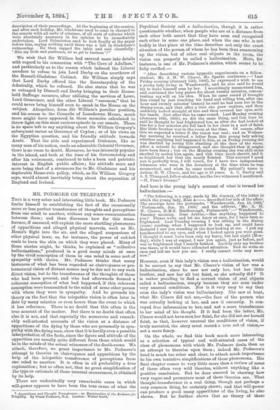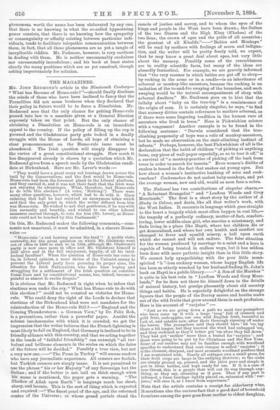MR. PODMORE ON TELEPATHY.* THIS is a very sober and
interesting little book. Mr. Podmore limits himself to establishing the fact of the occasionally more or less perfect transference of thoughts and perceptions from one mind to another, without any sense-communication between them; and then discusses how far this trans- ference, if assumed, will explain the more startling phenomena of apparitions and alleged physical marvels, such as Mr. Home's flight into the air, and the alleged suspensions of other physical laws; as, for instance, the power of red-hot coals to burn the skin on which they were placed. Many of these stories might, he thinks, be explained as "collective hallucinations," produced in a good many minds at once by the vivid conception of them in one mind in some sort of sympathy with theirs. Mr. Podmore thinks that many instances of what has been regarded as clairvoyance or pre- ternatural vision of distant scenes may be due not to any such direct vision, but to the transference of the thoughts of those who had been present, and who had afterwards formed a coherent conception of what bad happened, if this coherent conception were transmitted to the mind of some other person with whom they were in sympathy. And he grounds his theory on the fact that the telepathic vision is often later in date by many minutes or even hours than the event to which it has reference. There is no doubt that this often is the true account of the matter. But there is no doubt that often also it is not, and that especially the numerous and remark- ably well-attested accounts of the vision at a distance of apparitions of the dying by those who are personally in Byrn- pathy with the dying man, show that it is hardly even a possible interpretation of the facts, since the figure and attitude of the apparition are usually quite different from those which would be in the minds of the actual witnesses of the death-scene. We attach, therefore, no great importance to Mr. Podmore's attempt to theorise on clairvoyance and apparitions by the help of the telepathic transference of perceptions from one mind to another. It is often in all probability a true explanation ; but so often not, that no great simplification of the type or rationale of these unusual occurrences, is obtained by its help.
There are undoubtedly very remarkable cases in which will-power appears to have been the true cause of what the * Apparitions and Thought Transference : an Arantination of the Evidence/or Toispatiw. By Prank Podmore, MA. London Walter Scott, Psychical Society call a hallucination, though it is rather questionable whether, when people who are at a distance from each other both assert that they have seen and recognised each other in some one place, and when the one who is not bodily in that place at the time describes not only the exact situation of the person of whom he has been thus summoning up the vision, but of other real objects in the room, the vision can properly be called a hallucination. Here, for instance, is one of Mr. Podmore's stories, which seems to be fully verified :— "After describing various hypnotic experiments on a fellow- student, Mr. A. H. W. Cleave, Mr. Sparks continues Last Friday evening (January 15th, 1886), he expressed a wish to see a young lady living in Wandsworth, and he also said he would try to make himself seen by her. I accordingly mesmerised him, and continued the long passes for about twenty minutes, concen- trating- my will on his idea. When he came round (I brought him round by just touching his hand and willing him, after one hour and twenty minutes' trance) he said he had seen her in the dining-room, and that after a time she grew restless, and then suddenly looked straight at him and then covered her eyes ..with her hands. Just after this he came round. Last Monday evening (January 18th, 1886), we did the same thing, and this time be said he thought he had frightened her, as after she had looked at him for a few minutes she fell back in her chair in a sort of faint. Her little brother was in the room at the time. Of course, after this we expected a letter if the vision was real ; and on Wednes- day morning he received a letter from this young lady asking whether anything had happened to him, as on Friday evening she was startled by seeing him standing at the door of the room. After a minute he disappeared, and she thought that it might have been fancy ; hut on the Monday evening she was still more startled by seeing him again, and this time much clearer, and it so frightened her that she nearly fainted. This account I send you is perfectly true, I will vouch, for I have two independent witnesses who were in the dormitory at the time when he was mesmerised, and when he came round. My patient's name i.e Arthur H. W. Cleave, and his age is 18 years. A. C. Darley and A. S. Thurgoal, fellow-students, are the two witnesses I mentioned. —H. PERCY SPARKS."
And here is the young lady's account of what is termed her hallucination :— "The following is a copy, made by Mr. Gurney, of the letter in which the young lady, Miss A—, described her side of the affair. The envelope bore the postmarks, 'Wandsworth, Jan. 19, 1886.; Portsmouth, Jan. 20, I880,' and the address, Mr. A. H. W. Cleave, H.M.S. Marlborough, Portsmouth' Wandsworth. Tuesday morning. Dear Arthur,—Has anything happened to you ? Please write and let me know at once, for I have been so frightened. Last Tuesday evening I was sitting in the dining [room] reading, when I happened to look up, and could have declared I saw you standing at the door looking at me. I put my handkerchief to my eyes, and when I looked again you were gone. 1 thought it must have been only my fancy, but last night (Mon- day), while I was at supper, I saw you again, just as before, and was so frightened that I nearly fainted. Luckily only my brother was there, or it would have attracted attention. Now do write a1. once and tell me how you are. I really cannot write any more now."
However, even if this lady's vision was a hallucination, would it be correct to any that Mr. Cleave's vision of her was a hallucination, since he saw not only her, but her little brother, and saw her all but faint, as she actually did ? It is rather puzzling to find a correct vision of real objects called a hallucination, simply because they are seen under very unusual conditions. Nor is it very easy to say that even the lady's vision was hallucinatory. She saw at least, what Mr. Cleave did not see,—the face of the person who was actually looking at her, and saw it correctly. It con- veyed true information to her, and not a mere transference to her mind of his thought. If it had been the latter, Mr. Cleave would not have seen her faint, for she did not see herself faint, so that, however unusual the conditions of vision, if truly narrated, the story must record a true act of vision?... not a mere fancy.
On the whole, we find this book much more interesting as a selection of typical and well-attested cases of the class of phenomena with which Mr. Podmore deals, than as an attempt to theorise upon them ; indeed Mr. Podmore's head is much too sober and clear, to attach much importance to his own tentative simplifications of these phenomena. His final chapter comes to very little more than a review of some of these often very wild theories, without anything like a positive conclusion. But he does succeed in showing how very vague and premature most of these theories are. That thought-transference is a real thing, though not perhaps a very common thing, he certainly shows; and that will-power can produce a good many aprialitions of the living, he also shows. But he further shows that no theory of these phenomena worth the name has been elaborated by any one, that there is no knowing in what the so-called hypnotising power consists, that there is no knowing how the sympathy or consanguinity or affinity existing between particular indi- viduals, tends to facilitate telepathic communication between them, in fact, that all these phenomena are as yet a tangle of inexplicable riddles. Mr. Podmore, however, is very cantious in dealing with them. He is neither unreasonably credulous nor unreasonably incredulous ; and his book at least states clearly the many problems which are as yet unsolved, though asking importunately for solution.



















































 Previous page
Previous page